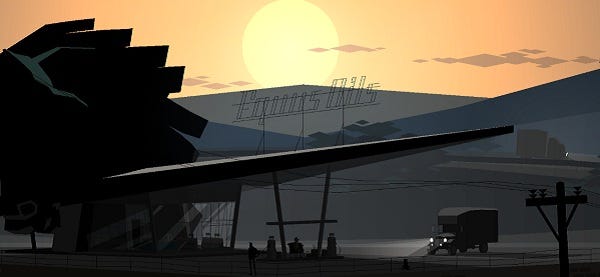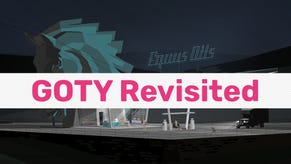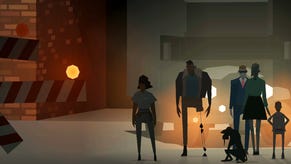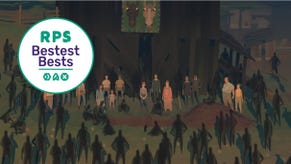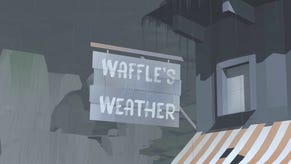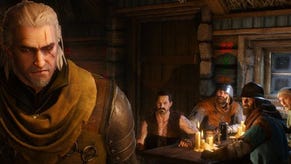A Psychogeography Of Games #1: Kentucky Route Zero
How Place Affects Game Design
This article is a part of a series based on 6 months as resident speaker at VideoBrains called A Psychogeography of Games. Psychogeography is a big chewy word put together by drunk French dudes in 1955 to talk about how the landscape of our lives affects how we feel, think and act. Here, I’m particularly interested in how the geography of our lives affects how we make games - the psychogeography of our games. So, in 2015, I’m going on a series of walks with some of my favourite game designers, in places that have affected how they think about what they make, and turning these into talks and articles.
This first piece is about a walk with Jake Elliott (Kentucky Route Zero [official site]). Except that because I don’t fly, the first walk happened in two different continents – we walked on the same day, on different continents, to similar places.
It’s spring. A tall, blue, who-knows-if-it’s-coat-weather day.
The 14:03 to Dalston Junction arrives at 14:06.
I get off at Shoreditch High Street station. It’s a new build, all high concrete ceilings, vending machines shrunken by the width of the ticket hall. I frown at Boxpark and it’s popped up shops. Less than 200m on, a Tower Hamlets branded litterbin overflows, two homeless men talk, sat on a discarded mattress. My podcast long finished, I leave my headphones in.
I nearly walk past the entrance. It’s thresholded by expensive stores in subtle navy blue and I worry again that not knowing London well enough I’ve chosen a Disneyland of a market – Greenwich, Borough – but on entering I find cobbles. Stalls covered in sedimentary layers of knick knacks.
I breathe out.
Jake and I talk over email to begin with. He explains that he lives just outside Elizabethtown, Kentucky. Kentucky is a large state - I type this and I think about the banality of that statement. I come from the second largest county in England, but I can cycle across it in less than half a day. Kentucky would take 30 hours, crossing 1 time zone.
Kentucky is largely flat farmland. There’s not really a way away from Jake’s house without using a car. His favourite place to walk is Peddler’s Mall, a flea market on the site of an old Walmart in Elizabethtown.
We decide that the walk we will go on, on the same day, will be through our local flea markets, I choose Spitalfields, he, Peddler’s Mall.
On the 2nd of April, on both sides of the Atlantic, we sift through the layers of pre-owned miscellany and choose 8 items between us, posting them to one another in the days following.
11th of May, 10pm BST, 5pm Eastern Time. Skype.
Jake tells me about his wife driving them to the Peddler’s Mall - about hoping that their 3 year old will fall asleep on the way.
He tells me about the run down car park, weeds growing up between the concrete, the shell of a Walmart in which the Peddler’s Mall now sits. Each booth unmanned, items tagged with a unique serial number.
He talks to me about the landscape that stands strongest in his childhood - the redwoods of Sacramento, where his grandparents bought a place to make into an off-grid refuge, ready for the collapse of society.
I tell him about sitting at the kitchen table when I was 3 or 4, colouring in the contours of a map of Lincolnshire, red, yellow, green; where would flood when the ice melted.
He tells me of the 3-hour car journey from Elizabethtown to Nashville Tennessee with his wife and sister-in-law. He says “the landscape here is really amazing […] some of the more mountainous parts of it are just really intoxicating.” Jake explains that was the germ of the idea for the game was in this passenger journey: “travelling on these highways. […] A lot of the game feels like you’re a passenger, to me. […] You don’t know where you’re headed exactly, not just you, but the characters don’t know where they’re headed […] they accept when people tell them to go places, even kind of strange places”.
I think of sitting in the passenger seat of a mini. I think of leather bucket seats and the computer he and I built together, touchscreen nestled in the central pillar of the dashboard. I think of dark nights in Leicestershire, scrolling through Winamp, choosing soft electronic music voiced by Benjamin Gibbard. The sub that replaced the boot hums and I can smell the heat on our skin.
The dialogue of Kentucky Route Zero kills me. It’s so delicate, so perfect, so evocative not just in the fact of it - in the elegance of the choice of it. Dialogue borrowed from the future, wandering a museum as you hear your choices remembered, reported by the people you encounter. Dialogue shifting between owners, the typical hero fizzes and fades, as you’re retuned to the angle of one of his co-adventurers.
The characterisation is pre-owned by the writer, Jake describes how it’s important for him not what the player chooses, but that they see the choices, all the ways of being the character the player guides.
I ask Jake if there’s a place that he thinks of, when he and Tamas talk about the Zero. He says: a 5 day bus trip from Seattle to New Orleans. Not a place exactly, but “It felt like [one], people would come and go, you would be on the bus with maybe the same 30, 40 people for a day and some of them would filter off as they reach their destination […] all these different overlapping trips, no regard for time of day […] it became this very surreal experience […] that’s how I feel about the Zero, you’re kind of half asleep, but very grounded, you’re still eating and going to the bathroom and negotiating other people’s boundaries, but dreamlike.”
I ask him what the taste of the Zero would be, and he says “gas station coffee – it’s been sitting there on a burner for 12 hours.”
The people who came up with psychogeography also talked about détournement — a playful reclaiming of the edifices of capitalism, ways of joyfully re-making the world around us on our own terms. Play that asks ‘who says this is how we should do things?’ That recognises the absurdity that we accept as everyday, offers new absurdities.
Another French dude called Baudrillard talked in 1981 about the way the media replaces [what is] with [the way things appear], and that after a while we think about things as [the way they appear], and forget what they [actually are]. A moment becomes a photograph, a moment becomes a moment only if it is photographed.
In 1946 Hannah Arendt talked about the disrupted scale of the modern world - things “torn out of their functional context” - the city evicts us from a human scale, motor travel from a human pace, mobile phones and mp3 players from the need to seek immanent – nearby - human interaction. Contextless, we pass through “frictionless passageways designed as conduits or simply so vast or alien they have lost contact with human proportion”.
In Kentucky Route Zero, Xanadu says “it’s like a real place, they pick up garbage, they deliver mail, they go to work and to church… but it has an awful kind of emptiness”
The characters in Kentucky Route Zero aren’t only missing their functional context, they kind of forgot they were looking for it. They live lives of inbetween; delivery drivers, artists working desk jobs, boys who have lost their family, scientists tuning televisions in and out of static. All wandering a landscape of pre-used spaces.
Jake says that “a pretty consistent motif in the game [is] space that used to be something else, […] about the politics of reclaiming it, squatting [also] the mega-corporation side where a company will raze a neighbourhood and build something else […] -- the battle between the human and the superhuman scale, […] And debt. Homelessness. Having been displaced from your home.”
The landscape of Kentucky Route Zero is heavy with the scale of the United States. But it’s also heavy with the landscape of our lives. Our generation’s lives. It’s Homer’s Odyssey for a generation who can’t remember a time before capitalism won. It’s debt, and mouldy whisky, transcendent gigs on sticky floors, computers that break you and are broken. It is the songs your parents and their friends used to sing, lost houses, forgetting that owning a house was a thing. It’s a contemporary homelessness: people you travel with and you feel you might travel with to the ends of the earth, until they are suddenly,
gone.
If you enjoy this work, you can help support it by backing me on Patreon (VideoBrains is brilliant, but unpaid, so any help you can offer is much appreciated, please also consider supporting VideoBrains, run by the super Jake Tucker).
